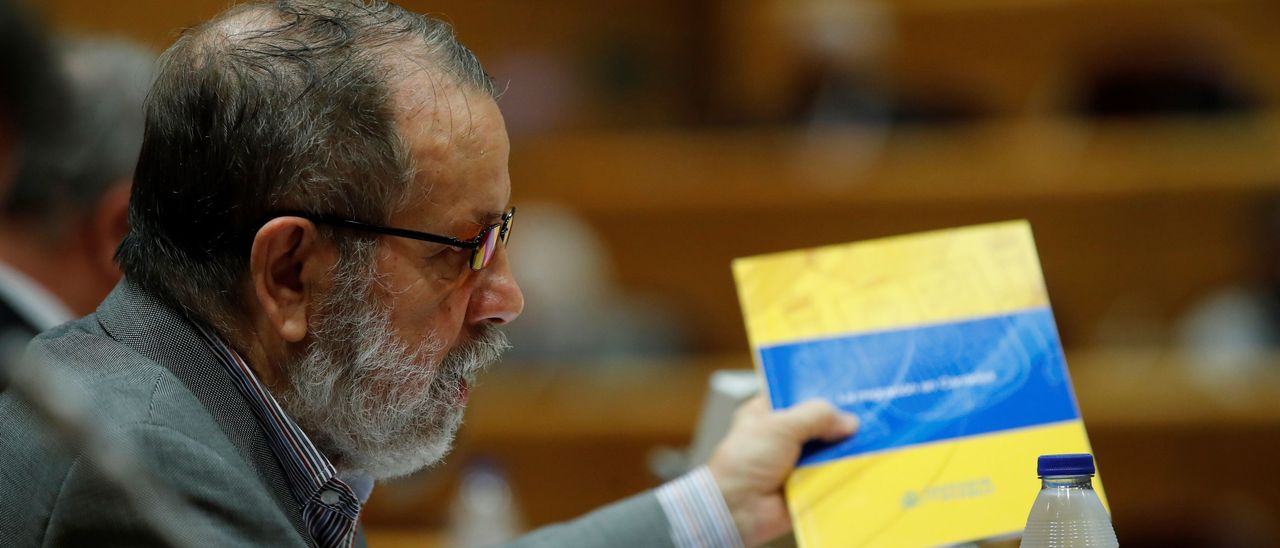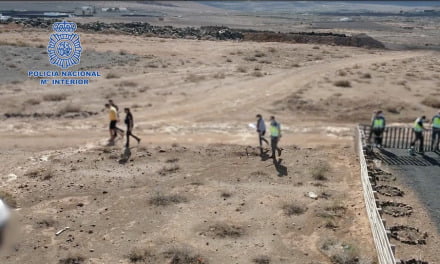The Ombudsman, Francisco Fernández Marugán, tasked, as the Public Defender, to investigate Spain’s response to The Canary Migrant crisis, has directly demanded that the Ministry of the Interior cease “police practices” that prevent migrants from leaving the Canary Islands to go to mainland Spain. He clarified that these measures are not justifiable, even through arguments for immigration control, nor does stopping onward travel avoid the so-called “pull effect”, as the central government have apparently maintained. During his appearance in the Spanish Senate, to present his report on the migration crisis in the Canary Islands and explain the result of the inspections carried out in recent weeks, the commissioner said that conditions have at least “improved” so far this year, in reception camps set up for specifically this purpose, but that a pending issue in the management of migrants trying to continue on their route from the Archipelago remains. He called for nationwide “solidarity distribution”, from among all Spain’s autonomous communities, to help care for the 2,776 unaccompanied minors that the Canary Islands community is currently protecting, in a situation that he described as an “unprecedented emergency”.
Fernández Marugán, Spain’s Ombudsman whose job it is to scrutinise the Government of Spain, said that the 3,780 migrant arrivals confirmed in the Canary Islands so far this year, up until the middle April (the latest official figures), represents and increase of 2,610 more people than those who arrived in the same period of time last year, that is a confirmed trend over recent months. In addition, he made clear that now “there is a significant deterioration in the health of the people who arrive” and that the arrival of women and children is increasing. So far this year, women have accounted for 13% of these arrivals, and 20% are children or adolescents. “Here is a new challenge. Migration was fundamentally male, without major health problems and as economic migrants. Today there is no such homogeneous migration ” he said, warning that the evidence points to increasing complexities in the management of migrant arrivals.
For Marugán, the “limitation of the movement of migrants is one of the problems of the migratory phenomenon”, he pointed out that “these limitations cannot be defended from the perspective of migratory control or to avoid the call effect.”
 “You have to go the other way. The judicial resolutions have ordered the Ministry of the Interior to cease this practice,” emphasised the commissioner. He reminded the Senate that the majority of Moroccan nationals are provided with a passport and with a return resolution but that because of the current situation these “are not enforceable because repatriation flights are canceled.” He highlighted the cases of migrants from other origins “who cannot be repatriated to their countries because that route is closed at the moment”, such as the case of Senegal.”The return system is today impractical,” he stressed.
“You have to go the other way. The judicial resolutions have ordered the Ministry of the Interior to cease this practice,” emphasised the commissioner. He reminded the Senate that the majority of Moroccan nationals are provided with a passport and with a return resolution but that because of the current situation these “are not enforceable because repatriation flights are canceled.” He highlighted the cases of migrants from other origins “who cannot be repatriated to their countries because that route is closed at the moment”, such as the case of Senegal.”The return system is today impractical,” he stressed.
The Ombudsman insisted that “it is profoundly inappropriate to convert particular areas of Spain or Europe into places of deprivation of rights, such as the right to free movement”, and that “reception places cannot become simply places where repatriation is expected.”
“We must move, without further delay, to avoid this legal limbo and see to what extent these citizens have minimally resolved their future conditions,” he insisted, referring to the fact that large numbers of migrants already have an onward plan, many with contacts, friends and families that they are trying to reach. As things stand right now, the state have to take full responsibility for clothing feeding and accommodating incoming migrants, with little or no ability to return them to countries of origin or transit, primarily due to pandemic restrictions.
The commissioner also took time to denounce the fact that women and children arriving on the Canary Islands often spend the first few days after their arrival being held at police stations and said that these are “police techniques” that should be done away with. “It is not a very humane way of acting,” saying that even “mothers with children have just been modestly restrained and are detained for 72 hours under very harsh conditions. This practice must cease immediately and these people must be referred to humanitarian facilities and not police facilities,” he said.
Migrant Minors
He said he also considers it to be a “regrettable fact” that there are minors in adult centres “due to the inadequate application of protocols that must be resolved.” He referred to the cases of children who have been separated from their mothers in these first days of arrival.. “It is a very hard action and we must see how this issue is resolved,” he said. “The children no longer come from their own country, they come from Africa, and we have to do everything possible so that these people are received with the greatest possible dignity,” he stressed.
One of the issues that Ombudsman Marugán had the most to say about was on the subject of unaccompanied minors, insistently calling for distribution among all Spain’s autonomous communities as a whole. “Minors cannot fall exclusively under the guardianship of the Canarian authorities. All Administrations must agree on a solidarity distribution ”, he urged. “In view of the figures, it is not reasonable for the Canary Islands to assume the challenge posed by this protection alone, it requires the collaboration and solidarity of the rest of the centres on the Peninsula” he demanded “and a political will for adequate financing by the State”.
Latest inspections
The commissioner explained that during recent inspections by several officials between the 11th and 17th of this month, to a total of six reception centres and to review minors on the islands of Gran Canaria, Tenerife, Fuerteventura and El Hierro, it has been noted that “there has been an effort made, and it has been known, to find emergency solutions to face planning that has not always been the most appropriate”.
Specifically, the Ombudsman’s inspectors looked at the detention centres in Barranco Seco (Las Palmas) and Hoya Fría (Tenerife); the shared management centres – where Covid-19 positive migrants are isolated – Nave del Queso (Fuerteventura), Palmera Mar (Gran Canaria) and Albergue Frontera (El Hierro); as well as the centres for minors on Gran Canaria and Tenerife. They also visited the centres at Canarias 50, Colegio León and Nave Bankia in Las Palmas; Las Raíces and Las Canteras on Tenerife; and El Matorral on Fuerteventura. All of them, have been qualified for the reception of migrants within the framework of the Spanish Government’s “Canary Islands Plan”. They also visited the port of Arguineguín in Mogán (Gran Canaria), which, according to the Ombudsman, “was empty.”
“The Canary Islands Plan” he said “was the search for an answer to the lack of emergency centres. Coordination must be improved, but we are no longer starting from scratch as happened months ago… We have started on the path to resolve the problem of arrivals, but problems remain to be solved,” he emphasised. He referred, for example, to various situations and complaints from migrants at different centres visited, many of whom have been transferred in recent weeks from hotels where they were temporarily housed to tents in the camps.
The Ombudsman explained to Spain’s deputies and senators the content of his report on the migration crisis on the Islands in 2020, which was first presented in the Cortes on March 3, and reiterated that it in his professional opinion, the report found that “the authorities were not prepared for an adequate response, that there was a lack of foresight, lack of coordination and a notable absence of reception measures”, as well as that “rights were repeatedly violated and the reception conditions profoundly degraded.”
He recalled that there were few lawyers available and that the spaces for them to act properly “are scarce or non-existent”, and he said that on many occasions lawyers are limited to validating with their signature the resolution of the returns. He urged that the Bar Associations ensure legal assistance “in adequate conditions.” He also denounced the shortage of interpreters of the African languages in which the migrants express themselves.













